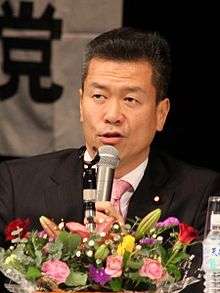Sumio Mabuchi
Sumio Mabuchi (馬淵 澄夫, Mabuchi Sumio, born 23 August 1960) is a Japanese politician and a member of the House of Representatives in the Diet (national legislature).
Sumio Mabuchi | |
|---|---|
馬淵 澄夫 | |
 | |
| Minister of Land, Infrastructure, Transport and Tourism | |
| In office 17 September 2010 – 14 January 2011 | |
| Prime Minister | Naoto Kan |
| Preceded by | Seiji Maehara |
| Succeeded by | Akihiro Ohata |
| Member of the House of Representatives | |
| Assumed office 5 February 2019 | |
| Preceded by | Shinji Tarutoko |
| Constituency | Kinki PR |
| In office 9 November 2003 – 28 September 2017 | |
| Preceded by | Masahiro Morioka |
| Succeeded by | Shigeki Kobayashi |
| Constituency | Nara 1st |
| Personal details | |
| Born | 23 August 1960 Nara, Japan |
| Political party | Independent |
| Other political affiliations | |
| Alma mater | Yokohama National University |
| Website | Official website |
Early life and education
A native of Nara, Mabuchi was born on 23 August 1960.[1] He holds a bachelor's degree in civil engineering, which he received from Yokohama National University in March 1984.[2]
Career
Until 2000, Mabuchi worked in private sector and became director of the firm he was working for at age 32.[3] He was elected to the House of Representatives for the first time in 2003 after an unsuccessful run in 2000.[4] He was appointed senior vice minister of land, infrastructure, transport and tourism in September 2009.[2]
On 17 September 2010, Mabuchi was named as the new minister of land, infrastructure, transport and tourism in the reshuffled Naoto Kan cabinet.[5] Mabuchi left prime minister Kan's cabinet on 14 January 2011,[6] after the then-opposition Liberal Democratic Party (LDP) passed a censure motion against him following the leaking of Japanese Coast Guard footage of the 2010 Senkaku boat collision incident. and ran unsuccessfully to replace him in the DPJ presidential election after Kan stepped down, losing to Yoshihiko Noda, who replaced Kan as Prime Minister.[4] After the Democratic Party of Japan suffered a major defeat to the LDP under Noda at 2012 Japanese general election. Noda resigned to accept responsibility for the defeat.[7]
The resulting DPJ presidential election was held on 25 December 2012, which was contested by Mabuchi and Banri Kaieda. It was won by Kaieda with 90 votes to Mabuchi's 54 votes.[8][9]
Mabuchi continued to hold his seat until he was narrowly defeated in the 2017 general election.[10] He had the highest ratio of margin of defeat (sekihairitsu) (97.27%) among all defeated candidates in the election.[11] Mabuchi returned to the House in February 2019 after the resignation of Shinji Tarutoko, who was contesting the Osaka 12th district by-election. Being the candidate with the next largest sekihairitsu in Kibō no Tō's 2017 Kinki proportional representation list, Mabuchi was next in line to fill Tarutoko's PR seat. Mabuchi chose to sit as an independent.[12]
Nickname
Mabuchi is a bodybuilder, and has been nicknamed "The Terminator".[4][13] On the other hand, he calls himself "lone gorilla".[3]
Personal life
Mabuchi is married and has six children, five of whom are girls.[3] His sparetime activities include surfing and cooking.[3]
References
- "Sumio Mabuchi". DPJ. Retrieved 27 January 2013.
- "Sumio Mabuchi CV" (PDF). Japan Transport. Retrieved 27 January 2013.
- Tsuzaka, Naoki (23 August 2011). "'Lone gorilla' draws support from junior lawmakers". The Asahi Shimbun. Archived from the original on 20 October 2012. Retrieved 27 January 2013.
- Johnston, Eric, "Contenders' backgrounds", Japan Times, 28 August 2011, p. 2.
- "Kan replaces over half of his Cabinet". Kyodo News. 17 September 2010. Retrieved 17 September 2010.
- "Japan PM adds new faces to cabinet in reshuffle". Agence France-Presse. 14 January 2011. Retrieved 14 January 2011.
- Mainichi Shimbun PM Noda to quit as DPJ chief after electoral disaster 17 December 2012
- Daily Yomiuri Kaieda elected new DPJ leader 26 December 2012
- Japan Times Kaieda takes DPJ helm; Ozawa overture hinted 26 December 2012
- 小選挙区開票速報:奈良県(定数3) (in Japanese). Asahi Shimbun. Retrieved 21 February 2019.
- "比例区開票速報:近畿ブロック(定数28)" (in Japanese). Asahi Shimbun. Retrieved 21 February 2019.
- "比例東海・近畿 青山氏と馬淵氏、繰り上げ当選に)" (in Japanese). Mainichi Shimbun. 5 February 2019. Retrieved 21 February 2019.
- Reuters Japan can't reject nuclear power out of hand: lawmaker 5 July 2011
| Political offices | ||
|---|---|---|
| Preceded by Seiji Maehara |
Minister of Land, Infrastructure, Transport and Tourism 2010–2011 |
Succeeded by Akihiro Ōhata |
| Minister of State for Okinawa and Northern Territories Affairs 2010–2011 |
Succeeded by Yukio Edano | |
| Preceded by Yasushi Kaneko Tokio Kanō |
Senior Vice Minister of Land, Infrastructure, Transport and Tourism 2009–2010 Served alongside: Kiyomi Tsujimoto→Taizō Mikazuki |
Succeeded by Wakio Mitsui Shūji Ikeguchi |
| House of Representatives of Japan | ||
| Preceded by Masahiro Morioka |
Representative for Nara 1st district 2003–2017 |
Succeeded by Shigeki Kobayashi |
| Preceded by 28-member district (seat vacated by Shinji Tarutoko) |
Representative for Kinki proportional representation block 2019– |
Incumbent |
|}
![]()